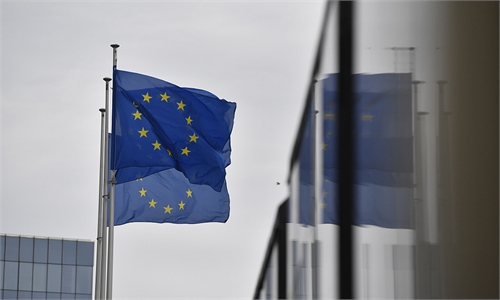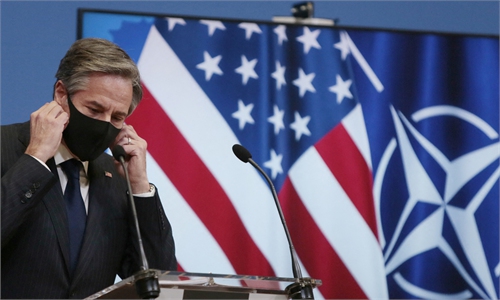
Illustration: Tang Tengfei/GT
The US and the EU have agreed to restart a bilateral dialogue on China, Reuters reported on Thursday. With the US attempt to woo allies to form an anti-China front shifting from Asia to Europe, the signals from the EU are both disappointing and regrettable.While there have been growing voices speculating that the US and the EU may have formed a "united front" against China, such an "alliance" is not as strong as someone think.
Even though it seems that some in Brussels and Washington have found a common ground in their anti-China ideology, their coordinated position is unlikely to lead to any concrete results. Fundamentally, political convergence is not enough to overcome their trade problems and bridge the differences of interest between the US and the EU.
Even as US Secretary of State Antony Blinken courted the EU against China, he did not forget to ask Germany to stop the Nord Stream 2 natural gas pipeline project, claiming that sanctions against it were a real possibility. Blinken said the pipeline "exposes Ukraine and central Europe to Russian manipulation and coercion, it goes against Europe's own stated energy goals." But from the Germany side, the US blocking may be only aimed at facilitating its sale of natural gas to Europe.
Moreover, trade frictions arising from the Trump era is also a major obstacle that both the US and the EU have to face during the Biden tenure. In 2018, the US imposed 25 percent tariffs on imported steel and 10 percent on imported aluminum from key allies in Europe, on the grounds of protecting US national security by maintaining healthy domestic production.
Ever since US President Joe Biden came to power, the EU has been holding hope that the Biden administration could roll back or adjust relevant tariffs. Early in January, the EU ambassador to the US called on the Biden administration to immediately remove tariffs on steel and aluminum from the EU and to settle their dispute over aircraft subsidies.
Putting aside the US-EU dispute over the aircraft subsidies that has a decade-old history, not long ago, observers generally expected that Biden's trade team may consider withdrawing or adjusting its tariff measures for the EU, as part of its policy to repair and strengthen ties with the old allies. Yet, such expectations are being continually dampened, which is sufficient to prove that the US doesn't bother to care about the economic interests of its allies under the disguise of seeking the so-called strategic interests, which ironically seems to go against the real interests of the EU.
In fact, it is not difficult to see the reasons behind the scene. The Biden administration's emphasis on the domestic economy means that adjusting tariffs, even for its allies with aligned strategic interests, is hardly possible, at least not until the president manages to lift the country out of its current economic woes.
Likewise, it is also hard for the EU to make concessions on any trade row. As the US and the EU are doomed to face their conflict of interests under intense domestic pressure, it will be interesting to watch whether they could find an aligned position when it comes to economic and trade benefits.



